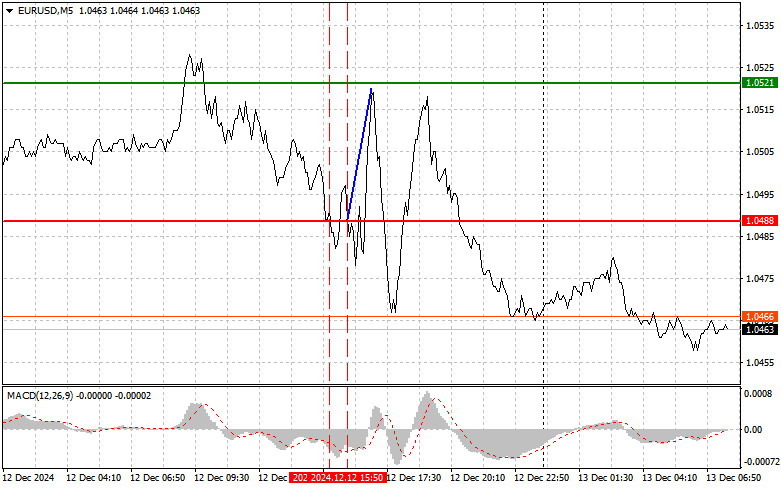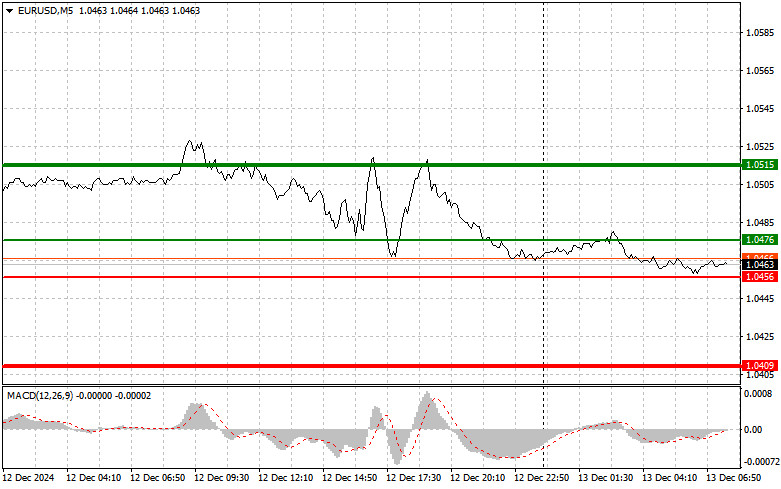Analysis of Trades and Trading Recommendations for the Euro
The test of the 1.0488 price level occurred when the MACD indicator had moved significantly below the zero mark, limiting the pair's downward potential. For this reason, I did not sell the euro. The second test of the 1.0488 level happened while the MACD was in the oversold zone, enabling the execution of Scenario #2 for buying, resulting in a 30-pip rise.
In the first half of the day, we expect data on Germany's trade balance, Italy's Consumer Price Index, and Eurozone industrial production. Investors have already begun exercising caution before these releases, as declining production may indicate a weakening Eurozone economy. With the European Central Bank actively lowering interest rates, weak fundamental data adds additional pressure on the euro. A drop in industrial activity will serve as another signal of instability in the region, potentially eroding confidence in the euro and triggering further sell-offs.
Additionally, the German trade balance data warrants attention. A potential decline in the trade surplus is expected due to reduced demand for export goods. If the figures fall short of forecasts, this could lead to a euro decline and intensify economic pressure on the region. Meanwhile, Italy's CPI could provide additional insight into the state of inflation in Europe. Persistent inflationary pressures may force central banks to respond, which would also affect currency exchange rates. As for the intraday strategy, I will rely more on realizing scenarios #1 and #2.
Buy Signal
Scenario #1: Today, buying the euro is possible if the price reaches 1.0476 (green line on the chart), with a target of rising to 1.0515. At 1.0515, I plan to exit the market and sell the euro in the opposite direction, expecting a movement of 30–35 pips from the entry point. A rise in the euro during the first half of the day can only be anticipated after strong Eurozone data. Important! Before buying, ensure that the MACD indicator is above the zero mark and starting to rise.
Scenario #2: I also plan to buy the euro today in case of two consecutive tests of the 1.0456 price level, provided that the MACD indicator is in the oversold area. This will limit the pair's downward potential and lead to an upward market reversal. A rise to the opposite levels of 1.0476 and 1.0515 can be expected.
Sell Signal
Scenario #1: I plan to sell the euro after the price reaches 1.0456 (red line on the chart). The target will be the 1.0409 level, where I plan to exit the market and immediately buy in the opposite direction, expecting a movement of 20–25 pips in the opposite direction from this level. Pressure on the pair can return anytime, but selling from as high a level is better. Important! Before selling, ensure that the MACD indicator is below the zero mark and starting to decline.
Scenario #2: I also plan to sell the euro today in case of two consecutive tests of the 1.0476 price level, provided that the MACD indicator is in the overbought area. This will limit the pair's upward potential and lead to a market reversal downward. A decline to the opposite levels of 1.0456 and 1.0409 can be expected.
Chart Notes
- Thin green line: Entry price for buying the trading instrument.
- Thick green line: A suggested target for Take Profit or manually locking in profits, as further growth above this level is unlikely.
- Thin red line: Entry price for selling the trading instrument.
- Thick red line: A suggested target for Take Profit or manually locking in profits, as further decline below this level is unlikely.
- MACD Indicator: Critical for identifying overbought and oversold zones to guide market entry decisions.
Important Note for Beginner Traders
- Always approach market entry decisions cautiously.
- Avoid trading during major news releases to sidestep volatile price swings.
- If trading during news releases, always set stop-loss orders to minimize losses.
- Trading without stop-loss orders or money management practices can quickly deplete your deposit, especially when using large volumes.
- A clear trading plan, like the one outlined above, is essential for successful trading. Spontaneous trading decisions based on current market conditions are inherently disadvantageous for intraday traders.












